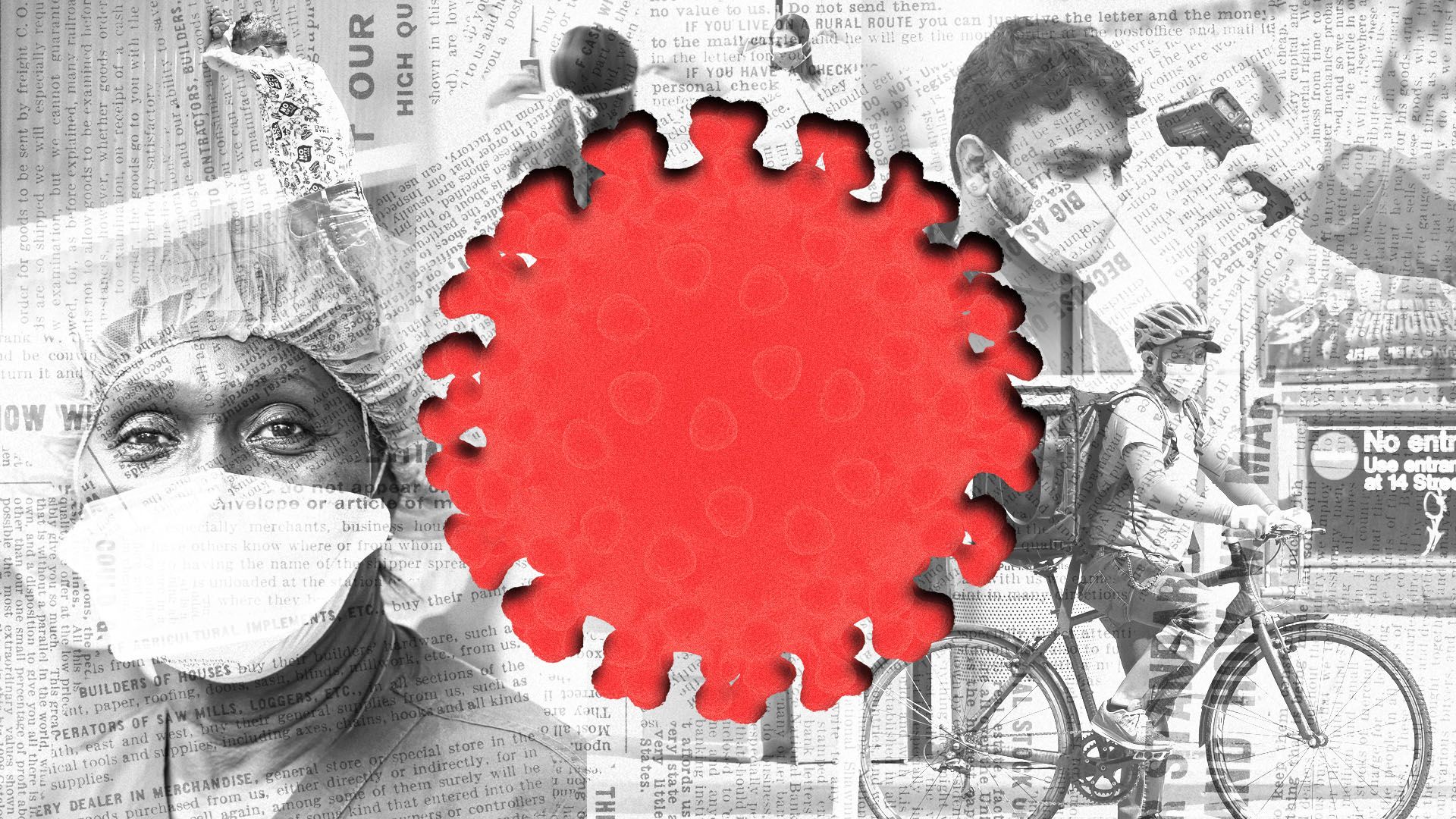What Matters 2020: Coronavirus edition
Add Axios as your preferred source to
see more of our stories on Google.

Photo Illustration: Sarah Grillo/Axios. Photos: Noam Galai, Jamie McCarthy, Josep Lago/AFP, Alfredo Estrella/AFP, and Narayan Maharjan/NurPhoto, all via Getty Images
Axios launched our "What Matters 2020" series this year to focus on seven issues that will define the nation's future no matter who wins in November.
The big picture: The impact of the coronavirus pandemic will spread far beyond the most pressing issues we face now — lives lost and economic disruption — to drive debates on all of these longer term topics. Go deeper with the Axios subject matter experts to explore each one.
Automation
The COVID-19 pandemic and the social distancing policies it demands have made human workers both potential victims and vectors of disease, Axios' Bryan Walsh reports.
- As a result, we're likely to see an acceleration of the trend towards greater automation in the workplace — with industrial robots and AI agents online.
- Experts' views range on how dramatic the impacts may be.
- Our thought bubble: If this results in human workers losing jobs to machines, as many experts expect, it could worsen an already terrible recession.
- "If we don't embrace the opportunities for re-skilling workers, there is a chance here for serious social unrest, on the level of the Great Depression," said Michael Lotito, co-chair of the Littler law firm's Workplace Policy Institute.
Misinformation
There's a misinformation crisis surrounding the coronavirus pandemic — and it's driving research on how to tackle misinformation that may serve as a roadmap for other episodes moving forward, Axios' Sara Fischer writes.
- She breaks down some of those strategies and discussions here.
- Be smart: President Trump has been at the center of much of this controversy himself, and that has created challenges for a range of players, from government doctors and health experts to governors, mayors, news organizations and social media companies.
Health care costs
The coronavirus has put the holes in the U.S. health care system on display, Axios' Sam Baker reports.
- Millions of people have lost their health insurance as they’ve lost their jobs. And though the government has stepped in to cover the cost of coronavirus care, that’s no help to people with chronic conditions, or who get sick with anything else.
- A slow recovery will leave many of those people at risk for a long time.
- All of the things that have made the U.S. system such a burden before — an industry chasing profits first, a patchwork system of coverage that varies from state to state and employer to employer, backwards incentives that put patients at the greatest risk just when they can least afford it — are working against us now, too.
China
The coronavirus has unraveled Washington's bipartisan consensus on China, per Axios' Bethany Allen-Ebrahimian.
- Until now, there was general agreement among leading Republicans and Democrats that America's policy must address China's hard authoritarian turn. Now they're split over Republicans' efforts to blame China for the pandemic.
- The pandemic also has further fractured the U.S.-China relationship, escalating tensions to levels not seen in decades.
- It has put pressure on China to improve its image, resulting in a campaign to provide medical supplies to countries fighting an outbreak — but also in Beijing adopting Russian-style disinformation tactics on a global scale.
Climate change
As the pandemic has overshadowed most other news, climate change has receded somewhat from its perch as a rising political topic, per Axios' Amy Harder.
- At the same time, a number of scientists and advocacy groups have sought to address questions or raise awareness about potential connections between major environmental disturbances and the evolution of future viruses or patients' ability to fight them.
- Expect climate change to be a key part of larger arguments Joe Biden makes against Trump, including accusing him of disavowing science of all kinds and calling for clean energy to drive an economic recovery if he wins in November.
- The other side: We’ve already seen a glimpse of how Trump will respond: his campaign released a statement recently suggesting Biden is belittling the pandemic by linking it to climate change.
Capitalism
Countries with strong job protections and welfare states have had many fewer struggles than the U.S. when it comes to keeping workers employed, so that they can go immediately back to work when lockdowns are lifted, per Axios' Felix Salmon.
- This crisis has exposed a key weakness of laissez-faire capitalism and at-will employment.
- Our economy will take a long time to recover.
- The big picture: As we've been reporting and as our Axios-Ipsos Coronavirus Index has been showing each week, the pandemic has turned inequality into a comorbidity. Better-off Americans are still getting paid and are free to work from home, while the poor are forced to either risk going out to work or lose their jobs.
Demographics
The virus is having a widely disparate impact on different racial and ethnic communities — with a potentially transformative reach on Generation Z, and lasting implications for immigration policy, per Axios' Stef Kight.
- Racial disparities: Racial and ethnic minority communities are being hit worse than white populations, according to a Brookings Institution data analysis. It found that the size of a county's white population was inversely correlated to infection and death rate from COVID-19.
- Gen Z: The virus is transforming the political beliefs and economic prospects of Generation Z, as Axios has reported. The youngest generation is now beginning to graduate into a workforce that no longer has jobs or internships for them.
- Immigration: In addition to Trump administration policies restricting immigration flows because of the virus, immigration also could slow because of the economic downturn in the U.S. caused by the virus. This comes as the many cities and states increasingly rely on immigration for population growth.
